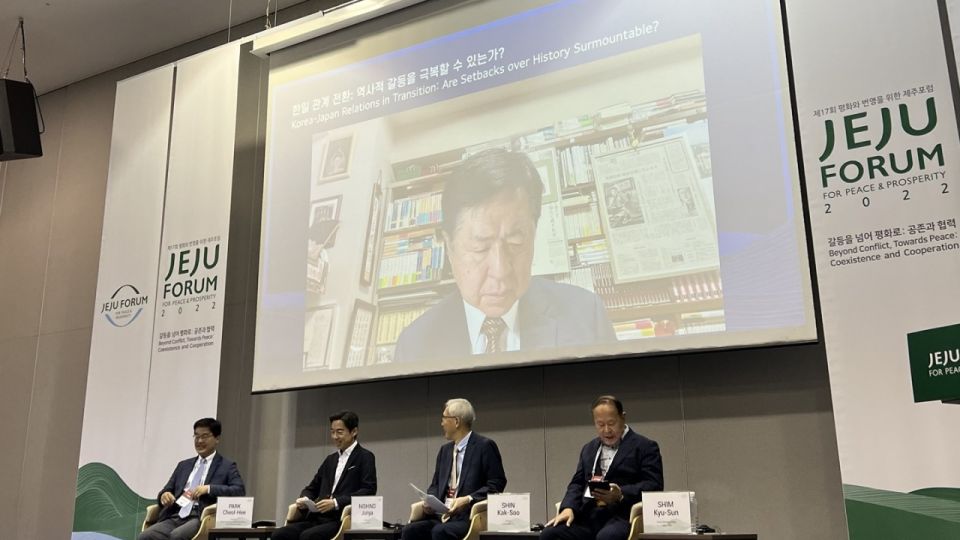September 16, 2022
SEOUL – A former South Korean ambassador to Japan said Korea should “freeze” the liquidation process of Japanese firms accused of using forced labor in the early part of the 20th century to mend ties with Japan, as the country’s top court continues deliberating on a critical ruling in the case.
Seoul should also legislate any final settlement made over the issue with Japan to put an end to the dispute once and for all, Shin Kak-soo, who served as ambassador to Japan from 2011-13 under the Lee Myung-bak administration, said in a forum held in Jeju on Thursday.
Speaking at the session dubbed, “Korea-Japan Relations in Transition: Are Setbacks over History Surmountable?” Korea-Japan relations experts backed Shin’s idea, saying that the two countries should pursue a future-oriented approach to recover fractured bilateral relations.
The session, organized by the East Asia Foundation, was part of the 17th Jeju Forum for Peace and Prosperity, held in Jeju.
Bilateral ties between Korea and Japan are at a low point, after South Korea’s Supreme Court handed down a ruling ordering Japanese companies to sell their assets based in South Korea to provide compensation for the Koreans whom they forced into labor during the Japanese occupation of Korea from 1910 to 1945.
With the liquidation process date approaching, Seoul is seeking to come up with a solution that would avoid severing ties with Tokyo.
For the two countries to reset their relations, they should think outside the box, and take a step back from the focus on each other to understand their roles in the world, Nobukatsu Kanehara, professor at Doshisha University in Japan, said. He attended the session remotely.
“The two countries should understand that their bilateral relations affect the overall order of Asia and the world,” Kanehara said.
Pointing out that South Korea’s diplomatic policies are largely focused on North Korea and the Korean Peninsula, Kanehara said its bilateral relations with Japan can be readjusted when it looks at the broader picture of geopolitical dynamics.
“If a war were to break out in South Korea or Taiwan, the Japanese government is committed to supporting them, as a rear base. South Korea is often absorbed with North Korea issues and looks to the north, but it should look to the south and know that Japan and the United States are backing them up,” Kanehara said, adding that Korea should really think about what role it will play in the region beyond the Korean Peninsula.
The speakers urged the two countries to acknowledge how the strategic environment surrounding this region requires Korea and Japan to work together.
North Korea is progressing with its nuclear weapons and has announced a new nuclear doctrine, China is ramping up economic coercion to get what it wants, and these circumstantial factors are the very key reasons for Seoul and Tokyo to readjust their relations, they said.
The Yoon Suk-yeol administration, which came into office in May, has been eager to improve relations with Japan. But the Japanese government has been relatively passive, and at times lukewarm toward Korea’s efforts, amid rampant skepticism that the Korean government may change its stance, as the regime changes every five years.
“The Japanese government is aware of the change of stance of the current Korean government (on Japan relations) and of the efforts it is making for improvement. But even if (the Japanese government) holds the hands of the Yoon administration, they question what would happen after five years,” Junya Nishino, professor at Keio University in Japan, said.
Acknowledging Japan’s concerns, the former ambassador Shin said it is very important that any settlement made with Japan should be legislated so political parties across the aisle can accept the final agreement of the two governments.
At the same time, Japan should also do its part to normalize bilateral relations, Nishino said, and that the leader’s “resolute decisions” can make it happen.
According to the professor, Japan believes it has already apologized for its wartime misdeeds, and it may be difficult for the Japanese government and the companies to take responsibility and directly admit its faults to the victims.
Still, Japanese Prime Minister Fumio Kishida should be determined enough to remind Korea of Japan’s past efforts with his own words, to resolve the current disputes and move on, Nishino said.
The speakers agreed that a future-oriented approach is crucial to putting an end to the decades-old disputes.
“Because Korea and Japan are neighboring countries, frictions are ought to happen. But they are paying a great amount of opportunity cost of great potential because they obsess over them,” Shin said.
“The two countries should shift their perspectives toward a global outlook, cooperate with each other and build trust, and that would provide the chance for them to resolve their bilateral disputes.”
While both governments have expressed their desires to reset ties, there remains a gap in public sentiment between Korea and Japan on whether both sides should patch up.
According to a joint survey conducted by Korea’s East Asia Institute and Genron NPO, a Japanese nonprofit organization, 81.1 percent of 1,028 Koreans responded that it was necessary to mend ties. Among the 1,000 Japanese respondents, however, only 53.4 percent of them said Japan should improve relations with Korea.


